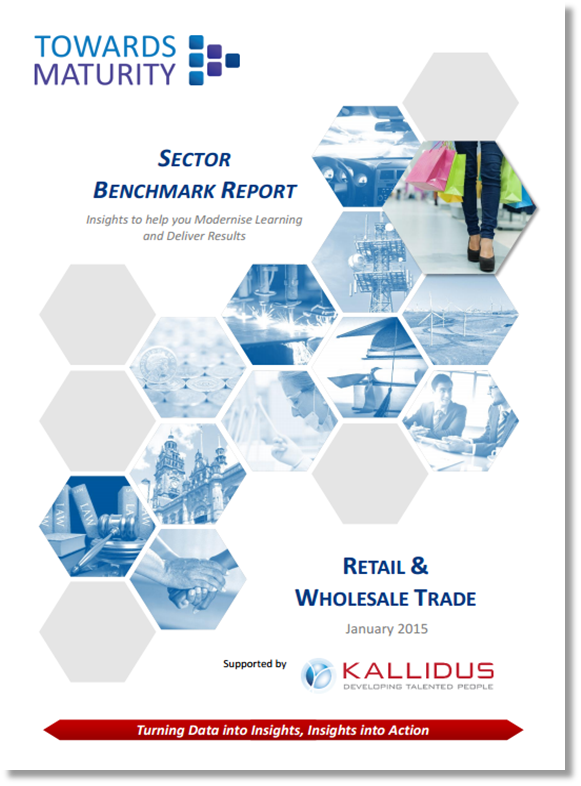
Retailers Reap the Rewards of Technology-Enabled Learning Strategies
Independent research by Towards Maturity launched at the Learning Technologies Summer Forum reveals that retailers are improving revenue, productivity and behavioural change amongst employees as a result of adopting technology-enabled learning, but there is still more opportunity to be had.
Launched today, the latest Towards Maturity study - the Retail and Wholesale Trade Sector Benchmark Report - is the fourth in a series of reports that assesses the impact of a technology-enabled learning strategy across a range of industry sectors.
Retailers report that learning technologies have had a significant impact on business outcomes. Compared with traditional training methods, they report a 34% improvement in their ability to change procedures or products, a 44% improvement in their ability to roll out new IT applications and a 26% improvement in customer satisfaction, which they attribute to the use of learning technologies.
Over half are using the learning they develop to inform their customers and suppliers of new products. Their approach to learning is 25% more likely than average to reduce time away from the job and improve external customer satisfaction. Retailers are also 50% more likely than average to agree that they are developing a better qualified workforce.
The study of 32 organisations shows that retail L&D staff have a greater knowledge about the potential use and implementation of technology compared to other sectors. They are also offering their employees a wider range of skills. Innovation in learning is a driving force in the sector, with 84% of the organisations surveyed now using mobile learning to help mitigate challenges with IT infrastructure and PC access, which is improving productivity, knowledge sharing and employee satisfaction.
Rob Caul, CEO of Kallidus (sponsors of this independent study) said: "It’s good to see that retail continues to be one of the most innovative and committed sectors to investing in technology for learning and is clearly delivering tangible business benefits through technology-enabled learning. The report highlights that retailers are now offering their employees a wider range of skills compared with other industry sectors and that further benefits stand to be gained through more integrated learning and talent systems. Kallidus is delighted to have contributed to this report which provides a wealth of insight to enable retailers to pioneer the next generation of learning for long-term business success and competitive advantage."
The retail sector scored well above the private sector average for the impact learning technologies had on learners. The research revealed:
- 70% of retailers strongly agree that staff can access learning directly relevant to their job
- 65% have increased the proportion of staff who are now on learning programmes
- 36% strongly agree that learners put what they learn into practice quickly
- 36% have noticed positive changes in staff behaviour
However, many learning programmes in the sector fail to achieve their potential, despite high levels of investment and a greater increase in training budget than most sectors over the last two years. There are a number of reasons for this, including:
- 84% unreliable infrastructure/low bandwidth/technical factors (66% on average)
- 74% cost of set-up, development and maintenance (69%)
- 68% lack of skills amongst employees to manage own learning (68%)
- 68% lack of skills amongst L&D staff to implement and manage e-learning (62%)
- 58% insufficient staff access to computers to be worthwhile (24%)
Commenting on the findings, Towards Maturity managing director Laura Overton, said: "Our report shows the retail sector is making good use of technology, which is having a direct impact on business effectiveness. However, challenges remain around delivering on-the-job learning at the point of need. As with other sectors, L&D teams lack the skills to implement effective online learning. The opportunity here is huge; by understanding the needs of learners, L&D teams in the sector will be able to design and deliver relevant learning initiatives at the point of need."
The Retail Sector Benchmark Report is one of eight planned sector-specific reports. The Health and IT & Telecoms Sector Reports are due to be published by the end of June. Each report provides key performance indicators for each sector such as productivity, revenue and attrition rates, comparing them with the top performing companies in the sample as a whole. The reports also outline the detailed benchmark comparisons of implementation activities in each sector compared to the practices of top performing organisations.
The Retail Sector Benchmark Report is free to download at www.towardsmaturity.org/2015retail thanks to the support of Kallidus, one of Towards Maturity’s Ambassadors.
END
Notes to Editors
Data gathered via the annual Towards Maturity Benchmark in 2014. The 2015 Benchmark programme, which is currently open, allows L&D leaders to confidentially review their current L&D strategy and receive a free Personalised Benchmark Report to help improve L&D performance. Additional information about the 2015 Towards Maturity Benchmark study can be downloaded at www.towardsmaturity.org/2015benchmark.
Laura Overton is available for interview.
This press release may be re-produced in full but with a link back to the original source.
About Kallidus
Kallidus is an award-winning supplier of integrated learning, performance, 360 and talent management technologies, bespoke e-learning content and consultancy services. Dedicated to customer excellence, Kallidus supports some of the world’s largest and best-known brands, including Boots, Specsavers, and Morrisons, as well as the NHS, O2, Transport for London and Eurostar. Kallidus works in partnership with customers to provide innovative, trusted talent solutions that empower employees to develop continually, learn effectively and improve performance.
For further information, visit www.kallidus.com or follow @Kallidus on Twitter.


